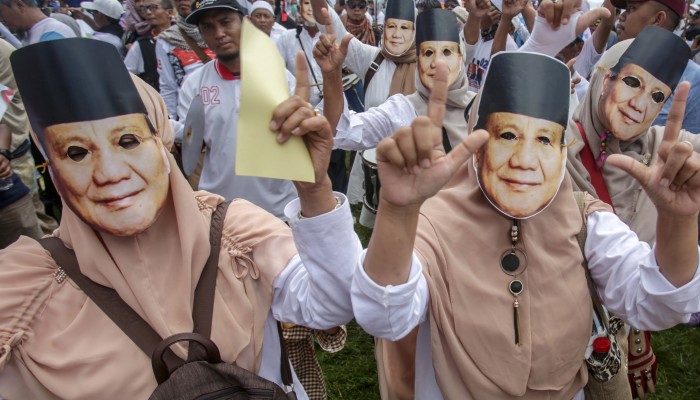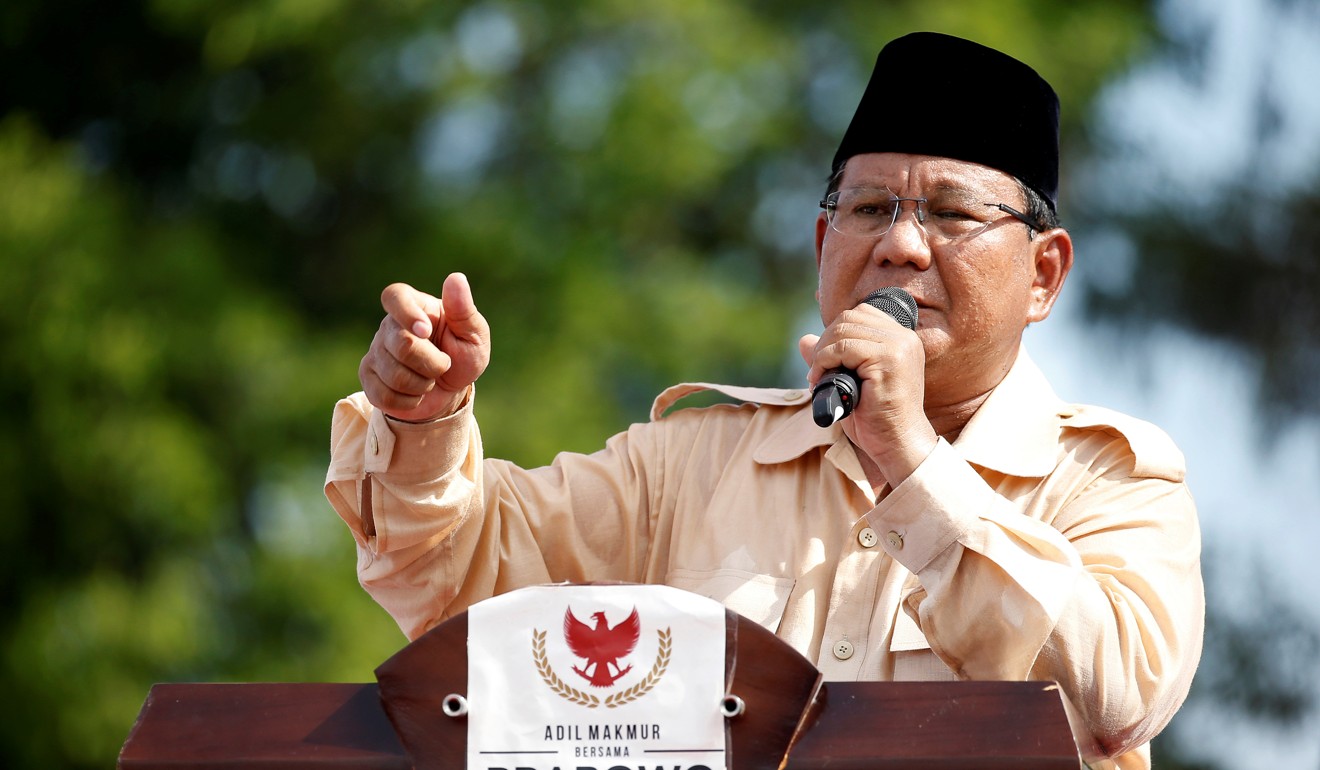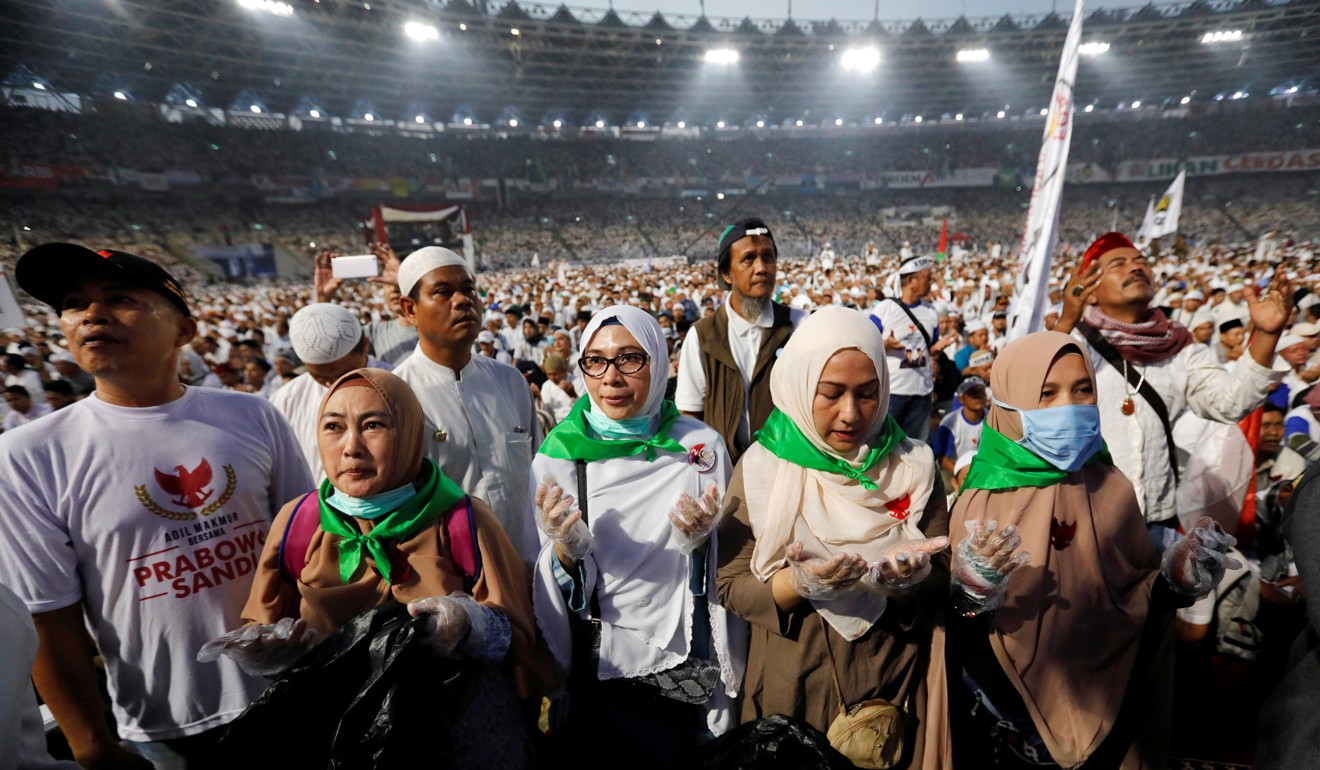
The sun beat down on the city of Solo in Central Java on Wednesday but it did little to prevent thousands of supporters of Prabowo Subianto pouring into Sriwedari Stadium.
The former general is seeking to unseat Indonesian President Joko Widodo at next week’s election. One of his supporters, Titiek Handayani, 34, left home with her two young children early in the morning, travelling by bus from Sragen 30km away.
“It is important for us to come here,” she said. “I want to see Prabowo and listen to his speech.”
Solo, a city with a population of about 500,000, is the hometown and stronghold of Widodo, popularly known as Jokowi.
The former furniture entrepreneur launched his political career in Solo, becoming mayor in 2005 and re-elected in 2010 after cultivated a reputation for transparent, efficient public administration. In 2012, he became the governor of Jakarta, the Indonesian capital. Then, in 2014, he was propelled to the highest office in the country, beating Prabowo in the presidential election with 53 per cent of votes. His vote share in Solo was 84 per cent and on Tuesday he urged voters to return him and his running mate, cleric Ma’ruf Amin, with an even stronger mandate.
“Central Java is a determining point,” Jokowi told his supporters. “We need to ensure that we will win here more than 84 per cent. We can do it, for sure we can win up to 90 per cent.”
During the campaign, Jokowi has highlighted the importance of Solo in his rise, regularly reminding his supporters of their role in his success, and of how improvements in Solo have been replicated all over the country.
“Our economy is in strong position,” Jokowi said. “Our poverty rate is the lowest in history.”
A day later, Prabowo painted a very different picture, claiming Indonesia is a country on the brink of collapse – and only he and his running mate, Sandiaga Uno, can save it.
“We are on a holy mission to save our nation,” he said. “Saving it from being robbed due to our national wealth being taken abroad and leaving our people behind. Saving our nation from wealth that only benefits a handful of people.”

Prabowo has also pledged to promote growth and transform Indonesia into an “Asian Tiger”. To that end, he urged supporters to remain optimistic and work even harder.
“I voted for Prabowo five years ago and I will still give my vote to him,” Titiek said. “I believe he will bring significant changes to our nation, particularly in the economy and our national pride.”
Under Jokowi’s administration, Titiek said, life had become harder: basic items have become more expensive and it is harder to find a job.
We are on a holy mission to save our nation – Prabowo Subianto
“It’s not only my opinion,” she said. “This is the daily reality of Indonesian citizens. That’s why we demand a transformation which can only be done by Prabowo and Sandiaga. With Prabowo as our president, we can be an ‘Asian Tiger’ once again.”
Yakob Maulana, a 19-year-old factory worker from Klaten, shared Titiek’s sentiments.
“Finding jobs is more difficult now, as our president warmly welcomed Chinese workers to work in infrastructure projects,” said Yakob, a member of a youth organisation affiliated with the Islamic-based United Development Party.

During the campaign, online misinformation – or “fake news” – has stirred anti-Chinese sentiment. One hoax claimed there were 10 million mainland-born workers in the country. Figures from the Human Resources Ministry show there were 95,335 foreign workers last year: 32,000 from China, 13,897 from Japan and 9,686 from South Korea.
Titiek pointed to her circular headband in the hijab, which had the words #2019GantiPresiden, which means “2019 Change the President”, a hashtag commonly used by Prabowo’s supporters on social media, scrawled with black marker on white fabric.
“This is what the people want,” she said. “We are fed up with Jokowi and looking for a better future.”







